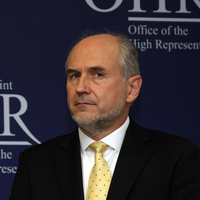SARAJEVO, Bosnia and Herzegovina -- Bosnia's elections on Sunday offered little reason to expect any normalization for the divided country in the near future. The country's ethnic Serb entity re-elected leaders who have called for independence and denied genocide, while many Croats backed parties supporting further division along national lines. Despite a rise in support for moderate parties, these recalcitrant nationalists may impede the reforms envisaged by the international community to reverse several years of backsliding.
The electoral arrangements themselves offer insight into Bosnia's complex political arrangements, established by the 1995 Dayton Accords that ended the country's civil war.
The voting consisted of polls for a number of often-overlapping representative bodies and presidential offices. Voters chose members of the national parliament, those of the Federation (FBiH) -- the Bosniak and Croat entity -- and the Republika Srpska (RS) -- the Serb-dominated entity -- as well as the parliaments of the FBiH's 10 cantons. They also elected the members of the country's three-person national presidency -- one from each ethnic group -- and an entity president in the RS.

